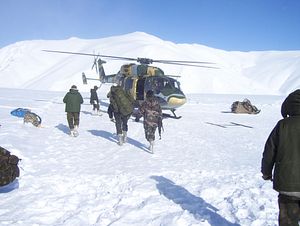The Indian Army will send a squadron of weaponized Hindustan Aeronautics Limited (HAL) Dhruv advanced light helicopters (ALH) to Likabali, Assam in India’s northeast to counter China’s growing military presence along the Sino-Indian border, the Hindustan Times reported on June 10.
According to anonymous Indian Army sources, a squadron of ten HAL Dhruv Mk-IVs, the weaponized variant of the helicopter, will be ready to deploy to the region in two to three months. This would constitute the India’s Army’s first deployment of armed helicopters to the Sino-Indian border and is part of an overall plan by the Indian military to beef up its military presence in the country’s northeast.
The armed variant of the Dhruv ALH features a 20-millimeter turret gun and can carry 70-millimeter rockets, air-to-air missiles, as well as air-to-ground missiles (including anti-tank missiles). The helicopter can be deployed for close-air support and high altitude operations. The Indian military currently operates over 100 HAL Dhruv helicopters of all variants.
The Indian Army has so far not publicly confirmed the future deployment of the helicopter squadron.
As I reported in May, the Indian Army has been pushing to build up its close-air support capability independent of (and often in competition with) the Indian Air Force for some time now. For example, the Army is set to place an order for up to 11 U.S.-made AH-64E Apache heavy attack helicopters, the latest and most advanced variant of the helicopter gunship. Overall, the service intends to purchase up to 39 AH-64E helicopters, divided up into three squadrons and to be stationed along India’s northeastern and northwestern borders.
The Indian Army’s Army Aviation Corps (AAC) will also likely induct a total of 114 HAL Light Combat Helicopters (LCH), a derivative of the Dhruv ALH currently under development. The LCH gunship can be armed with a 20 millimeter turret gun, anti-tank guided missiles, and air-to-air missiles. As I reported previously (See: “What’s the Status of India’s Light Combat Helicopter?”):
The LCH, which made its maiden flight in May 2010, has been specifically developed in response to the lack of an attack helicopter capable of performing high-altitude operations during the 1999 Kargil War. Consequently, the LCH, a derivative of the HAL Dhruv helicopter, has been primarily designed for high-altitude warfare – HAL and French engine-maker, Turbomeca jointly designed a special engine optimized for extreme altitudes – and has an operational ceiling limit of 6,000–6,500 meters (19,700–21,300 feet).
Next to procuring new combat helicopters, the Indian Army is also investing in new artillery for its 17 Mountain Strike Corps, a new formation expected to be operational by 2025. As a first step, the service will procure 145 M777 Ultra Lightweight Howitzers for the new corps, which has been specifically stood up to counter China’s military presence in the northeast. The Indian Ministry of Defense is also slated to station a land-based variant of the BrahMos supersonic cruise missile in the northeast.































